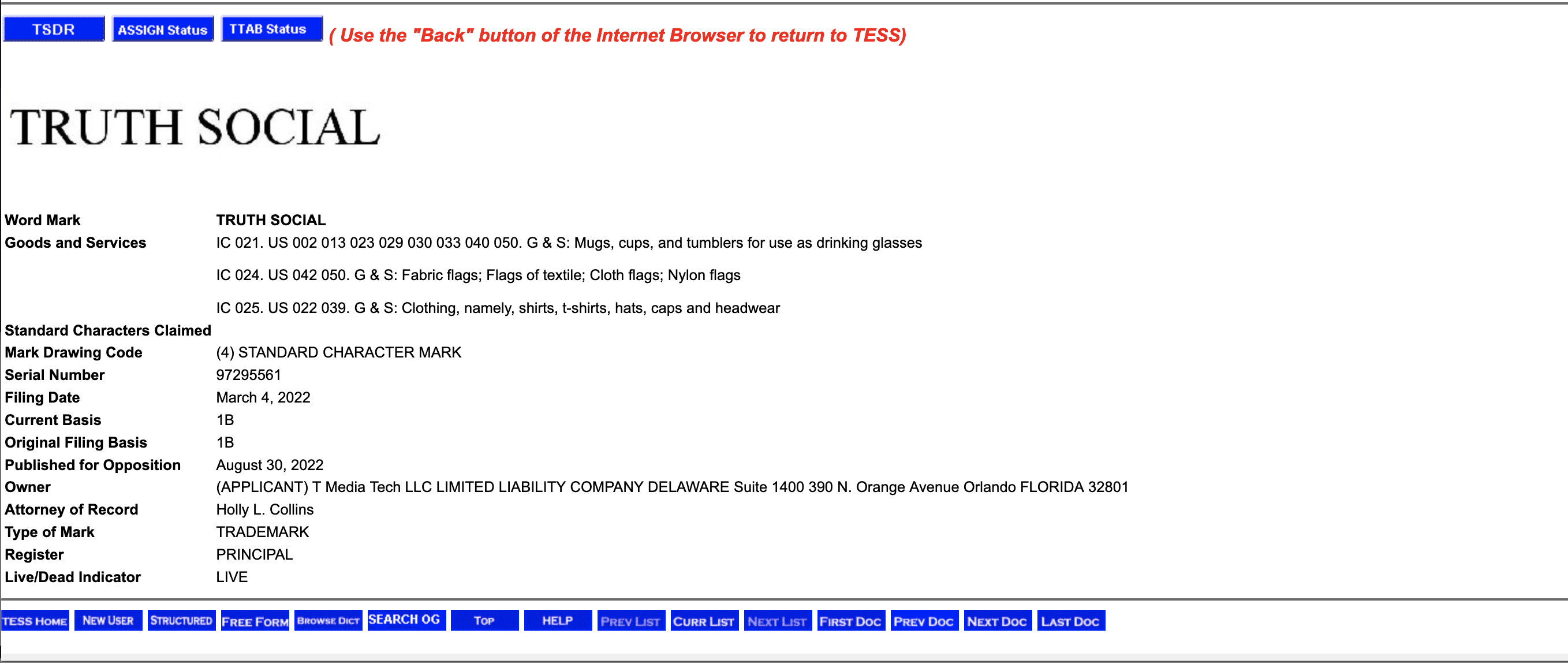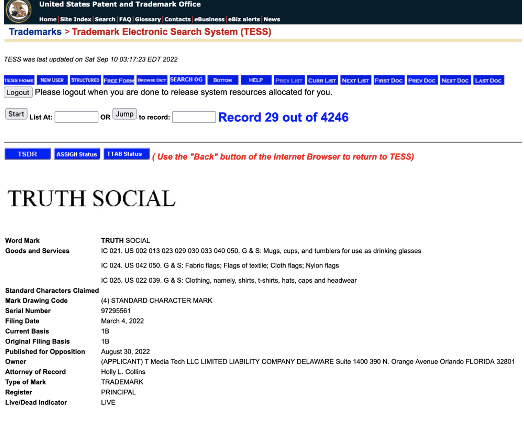Donald Trump, a divisive figure in our current political climate, has faced a massive setback with his new social media network “Truth Social.” On August 2nd, the United States Patent and Trademark Office (“USPTO”) denied Trump’s application to federally register (which grants federal protection of the trademark) the network’s name as a trademark. This is one of many setbacks that the former President has faced since leaving office. This relatively minor setback could potentially cause major re-branding issues for Truth Social further down the line if his appeal is unsuccessful. If Trump continues using the mark, he may be sued and will eventually have to change the name of his social media network or incur major legal fees.
What is a Trademark?
Let’s first discuss what a trademark is, and how one may acquire their own federally registered mark. Trademarks are everywhere – we see them online, on clothes, art, even in movies. I guarantee while reading this blog post, you’ll be able to spot multiple trademarks surrounding you.
First, a valid trademark is anything that is used in commerce on goods or services if it identifies and distinguishes the source; i.e. the company or entity it’s produced by. Picture your Starbucks cup in the mornings. That dark green mermaid logo, is a trademark. Or the name on the cup “Starbucks”, is also a trademark.

Courtesy of Hans Vivek
One interesting aspect of trademark law, is that there can be multiple trademarks for the same company. In order for a trademark to be valid, it must identify and distinguish the good or service from others, the trademark essentially identifies that the good or service comes from a specific source. When you see the Nike swoosh, even if there are no words around it, you know immediately that it’s a Nike product.
Once you create a logo, symbol, or slogan that identifies your source of goods and is used in commerce, you have a valid trademark. You have the option to federally register the mark with the USPTO, which means that you can gain federal protection for your trademark if the application is approved. As long as your application meets the requirement that your mark identifies the source of goods/services, and that the mark is not statutorily barred (certain statutes that do not allow a trademark to be granted federal protection), the USPTO will grant federal protection for your trademark.
However, if someone already has a mark federally registered that is similar to the one you want to register, and is related to the same goods/services, you may run into some trouble. This is exactly where Trump’s issues arose. If your mark is likely to cause confusion among consumers, the application will likely be denied. Trademark rights are not absolute, but if someone sees your mark and affiliates it with someone else’s, we run into problems. In trademark law, this is a barrier called “likelihood of confusion” or “actual confusion” and causes a lot of people and companies’ huge issues. Issues like threat of litigation, actual litigation, or being forced to change your trademark.
So, What Really Happened With “Truth Social”?
The USPTO rejected “Truth Social’s” application. It said that the name is too similar to two other federally registered trademarks, which provide similar services. Essentially, the mark could cause consumers to be “confused, mistaken, or deceived as to the commercial source of the goods or services of the parties”. The other two marks (which were already federally registered) were “Vero – Truth Social”, a social media app and “Truth Network”, a Christian radio service. The USPTO ultimately decided that the “Truth Social” name is confusingly similar to these two federally registered marks.
If Trump decides to continue using it as the name for his social media app, he could be at risk of being sent cease and desist letters or worse, sued for trademark infringement. If the latter occurs, he will likely incur great legal fees, and will ultimately be forced to change the name of his social media network if he doesn’t want to continue to be sued.
What About Other Marks With “Truth” In Their Names?
Now, I know what you’re all thinking, aren’t there other trademarks we see every day with the word “truth” in it? The answer is yes. However, the companies either did their due diligence before applying for the mark to make sure there wasn’t another already out there that would confuse consumers. Or the product and trademark related to an entirely different class of goods or services. For example, there already is a federally registered mark named “Truth Social”. But “Vero – Truth Social” and “Truth Network” were allowed to be registered. Why? Because it relates to an entirely different class of goods; mugs, cups, tumblers, flags, and clothing, so there is no likely or actual confusion.
Trump’s “Truth Social” mark is in relation to social media and is a downloadable app users can access on their phones, similar to Twitter. Since the other two marks that the USPTO cited in their rejection are social media and radio services, they were too similar in regard to their goods or services. Below, you can see the federal registration of the “Truth Social” mark, in relation to mugs, clothes, and flags.

Courtesy of the USPTO office
What’s Next for Trump?
Unfortunately for Mr. Trump, it is unlikely that his “Truth Social” mark will ever be able to be federally registered with the USPTO. Trademark attorney Josh Gerben explained that Trump’s legal team has about six months to appeal, but there’s only about a 33% chance of success. Normally, trademark attorneys do extensive research on the likelihood of success of their application before filing a trademark with the USPTO on behalf of their clients. At my job this past summer, I learned first-hand how this research really does take quite some time. Once attorneys conduct this research, they will then inform their clients that the mark is likely or unlikely to be registered. However, if a client really wants a trademark or name for their network for example, their lawyers will forge ahead with the application, despite clear warnings. If Trump continues down this path and continues using the mark without making any changes to it, he will likely continue to face roadblocks with the USPTO or could be liable for yet another lawsuit.
Alexandra Angyalosy
Associate Blogger
Loyola University Chicago School of Law, JD ‘24

